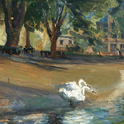Music festivals are off this year, of course. There is no way to have a festival that is socially distanced and still call it a festival. At festivals, you are not a person, but merely one body in a herd of cattle. It’s glorious. Everyone’s mindlessly grazing and defecating in the same field, watching with their big cow faces and their curious cow eyes. People claim they go to festivals for the music, and I don’t believe them. We go for the idea of music; we go for the break from civilisation; we go to become wild again. We go for spectacle.
Which is strange, particularly when you think how little spectacle there is in modern pop acts. The UK in particular is crowded with male singer-songwriters who look like your little brother’s friend that your mum is letting crash for a few weeks because he has “stuff” going on at home. Take our recent 20-something chart toppers. Lewis Capaldi has had a fight with his dad, your mother tells you fervently in the kitchen; Ed Sheeran isn’t getting on with his mum’s new boyfriend. And George Ezra! Well, love, George got caught with cigarettes in his schoolbag, and just needs to lie low for a minute. They are pop stars who do not look like pop stars, and aren’t doing much to overcompensate for the fact either.
The world doesn’t need another journalist picking on Ed Sheeran’s music, particularly as there’s nothing wrong with it. But there’s nothing to look at. This is not a dig about how Ed Sheeran looks: there is literally not much to look at. A typical Sheeran shindig has no dancers, no outfit changes, no cannons of confetti being shot into the crowd. There is just a man with his guitar and, gasp, a loop pedal. Is it the honest, stripped-back, three chords-and-the-truth authenticity that so many people yearn for in an age of online fabrication? Yes. Is it spectacle? No.
Women-led pop, however, knows how to put on a show. American singer Lizzo dominated festival coverage in 2019, and rightly so: a lingerie-wearing black flautist with a team of dancers, alternately rapping, singing and delivering motivational speeches on self-love? We cows in the field mooed deliriously. We didn’t know where to look. In her recent documentary, Miss Americana, Taylor Swift spoke on the need for female pop stars to be highly visual, and to change that visual often: “The female artists I know of have to remake themselves 20 times more than the male artists, or else you’re out of a job.” Meanwhile, the seven-piece Korean boy band BTS are starting a global revolution, attracting 50m online viewers for their high-energy gigs, proving that the male pop star who can put on a show is still very much in demand.
But watch festival coverage of most male UK pop music acts over the last 20-odd years and you’ll notice a trend. Each generation of white male pop stars dials down the action. Their movements become boxier, more conservative. Blur, headlining Glastonbury in 1998, are the epitome of era-defining British pop and yet Damon Albarn knackers himself out. A full brass band behind him, Albarn throws himself around the stage with neither rhythm nor grace, nearly jump-kicking his own trumpet player. He looks like an idiot, but he looks like the exact kind of idiot the cows want: a confident idiot. By 2002, Coldplay’s Chris Martin was headlining with a modest light show and doing the occasional well-timed jump like he’s Super Mario.
In 2010, a weird formality takes over, a stiffness that seems to take its inspiration from David Byrne: the men start wearing suits and jerking their arms in definitive downward strokes, their guitars held high on their chests. Era-defining acts Franz Ferdinand, Two Door Cinema Club and the Kaiser Chiefs all start dressing like they’re in a barbershop quartet. By 2016, when Martin’s back, his little jumps aren’t even leaving the floor anymore.
Every few years, the boys seem a little more frightened of themselves. Flamboyance has been slowly put to sleep. But why? Social media, the scapegoat for so many things of the last decade, has its share of the blame: as more phones are trained on the stage, “wild abandon” feels like a risk you don’t want to take. To try too hard as a man in British pop is to be a hair’s distance from camp: you risk veering into being a Nana’s favourite, à la Robbie Williams (who has never been afraid of aesthetics) or become perceived as a pseudo-comedy band, like The Darkness. Better to stand still, sing your soulful song, and be the guy that men will get a pint with and women will go on a date with. Low risk, high reward, bad show.
There are bright spots: Harry Styles and The 1975 are leading the way for a new era of gender exploration in male pop that isn’t actually new, merely 1987 warmed up again. By the time we can have festivals again, I hope the lads have come up with a nice show for us.

It's time to face the facts—our male pop stars need to try a bit harder
Britain is crowded with male singer-songwriters who look like your little brother’s friend that your mum is letting crash for a few weeks because he has “stuff” going on at home
July 12, 2020











